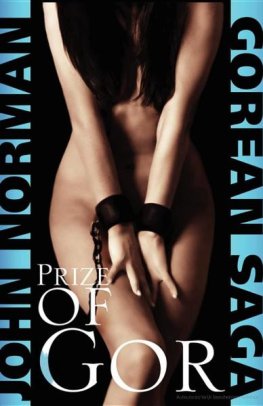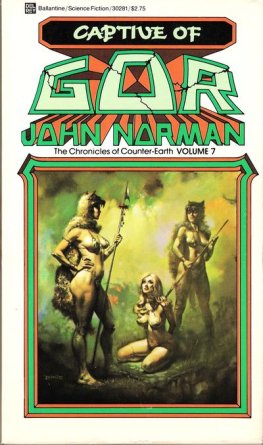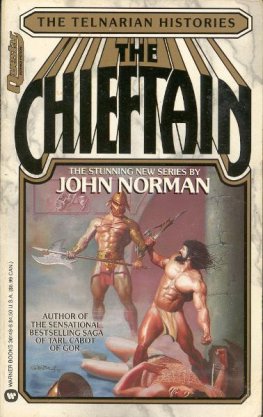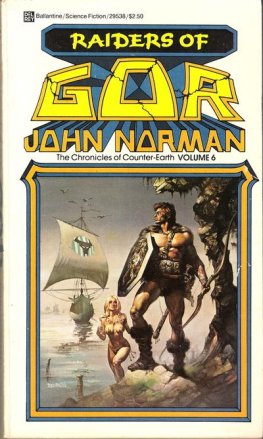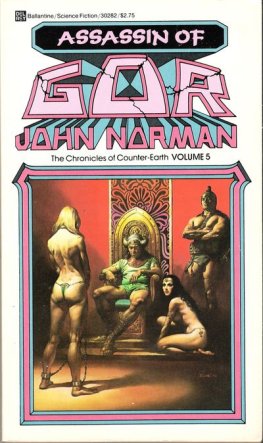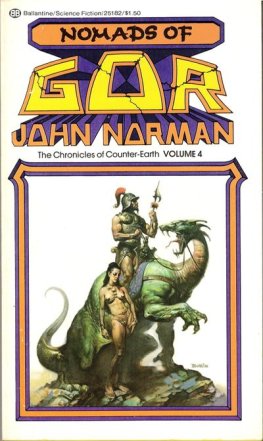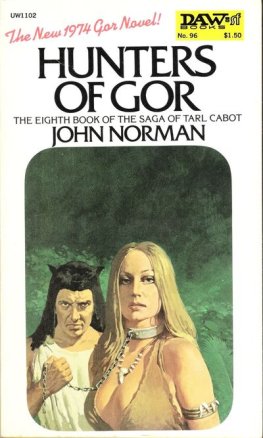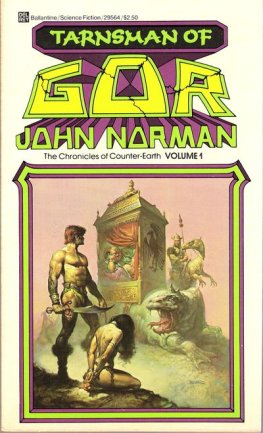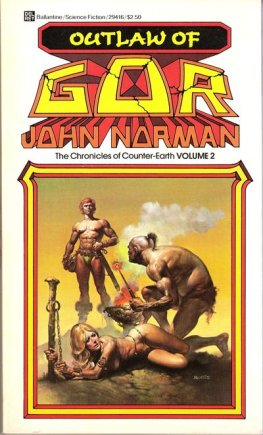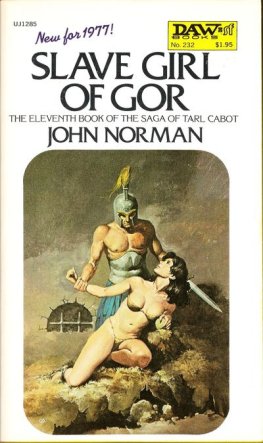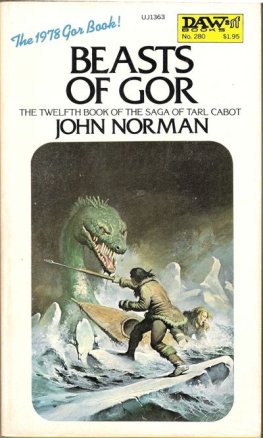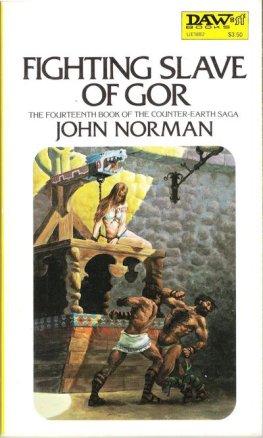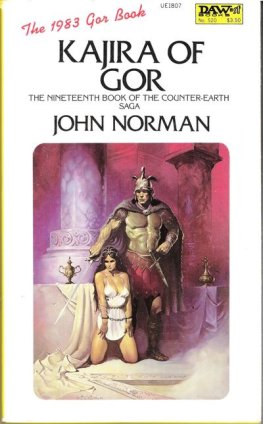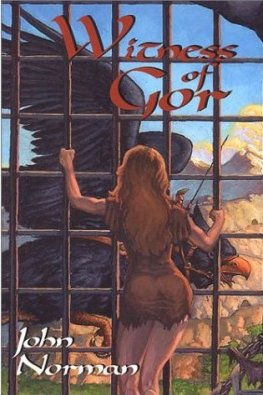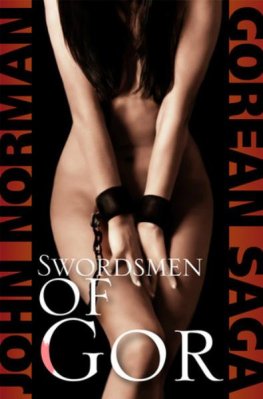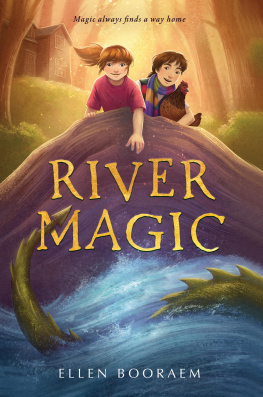PRIZE OF GOR
(Volume twenty-seven in the Chronicles of Counter-Earth)
by John Norman
Chapter 1
SHE PONDERS HOW TO TELL HER STORY, AND ATTEMPTS TO PROVIDE SOME UNDERSTANDING OR GUIDANCE FOR A POSSIBLE READER
I do not know how exactly to express these thoughts.
Yet I have been commanded to ruthless honesty. And I fear that if I did not comply, somehow they would know, as always it seems they do, perhaps from some small cue, perhaps some slight movement, or cast of feature, or shading of complexion, or tremor, or reluctance, unbeknownst even to myself. We are so helpless, so vulnerable. They seem to know so much. I seem to be transparent to them. I am not permitted to hide, even within myself. I do not know if you understand how terrifying that is, to have ones most intimate emotions, feelings and thoughts, ones soul, ones innermost being, so to speak, bared, exposed, even to a casual, even indifferent, scrutiny. How trivial, how inconsequential, compared to this is the mere baring of the body. Only they have known how to make me naked to myself, truly, and to them, sometimes to their amusement, and to my consternation and amazement, my shame, and my misery, as well.
I must decide how to tell this story. They have permitted me that much. It is my story, a very personal story, and so, it seems, one might most naturally use first-person discourse, and say, for example, I did this, and I saw that, and so on, and yet I am reluctant, afflicted with a certain timidity, to affect this voice. Perhaps I could speak more straightforwardly, more candidly, if I saw myself as another might see me, and yet, at the same time, saw myself, as well, from within, candidly, openly, hiding nothing, as one within, as I myself, might know me. So then I might say She did this, and She saw that, knowing that the she is myself, my own sentient, so much, sometimes so painfully so, self-aware self. How shall one speak? Perhaps I shall shift my modality of discourse, as seems appropriate, given what I must say, what I must tell. I do not know. How foolish to hesitate before such a small matter you might suppose, but to me it does not seem so small at all. It might seem a simple thing, how to tell a story, but it is not so easy for me. You might, of course, I do not know you, find no difficulty in this. But had you had my experiences, and were you I, were you faced with yourself, and frightened, or disconcerted, or shamed, you might, too, seek to distance yourself from that most sensitive, usually most zealously concealed, of subject matters, yourself. So I thought that I might begin, at least, by speaking in the third person, by considering myself, by seeing myself, from within and without, rather as an object, a particular object. Too, this is, I conjecture, in my current reality, not altogether unfitting; indeed, it is altogether appropriate, for you see that is what I now am, categorically, explicitly, an object, and not merely in the eyes of the law, but such irremediably, incontrovertibly, in the very reality of this world. So perhaps then I should write of myself as an object, for that is what I now am, as a simple matter of fact, an object, no longer a person, that no longer, if I were once that, but an object, to be sure, a very particular object, but one of countless hundreds, perhaps thousands of such, I do not know, in many cities, and towns, and camps and villages, like me, a vital, sentient, so much alive, so vulnerable, essentially helpless, beautiful I am told, object.
Perhaps the next problem that she must solve is how to speak frankly, honestly, of her age. In one world, in one reality, she was in her fifties. It does not make much difference, of course. She might have been in her forties, or in her sixties, or seventies, or such. Such matters, recorded in the routes of a world about a star, calculated in the increments of calendars and clocks, constitute no more in themselves than the memoranda of convenience, taking their true significance only in their application to changes which might be noted with interest, the germination of the seed, the blind struggle from the earth, the response to the lure of light, the birth of the anxious bud, the bursting into beauty of the flower, the glory of the unfolding, exultant petals, and then the loss, the drying, and casting away, of the petals. We count these things in hours, in days, in seasons, in years and years of years. But the clock is indifferent to what it counts; it considers with equanimity the antics of the foolish, the ecstasies of saints, the sweet, lovely nonsense of dreamers, the delusions of realists, the comings and goings of nations and empires, the passing of immortal faiths and eternal truths, life, and death, and suffering, the contumely of armed, belligerent error, the division of cells and the birth of stars. But if these things should begin again time would take no notice. It makes nothing happen; it only watches. You see, the calendar does not determine the flower; it only watches; and it will see what the flower does, and will not, indeed cannot, interfere. I suppose that these things are mysterious, or, perhaps, rather, so simple that it is difficult to speak of them. Obviously time counts the rock and the flower, the atom and the molecule, similarly, and yet the rock may witness the passing of several calendars, and the atom may in itself remain much the same as it was long ago, in the fiery midst of some distant, exploding star. Too, one would suppose that the theorems of geometry have not aged. They are doubtless as young, as fresh, as lovely, as new today, as they once were in a study in Alexandria. And should any beings anywhere, of whatever appearance, or shape, or chemistry, or origin, even after the dissolutions and births of countless worlds, devise such a system, the same, with its definitions and postulates, these theorems will await them, as pristine, as irresistible as ever in their austere, apodictic beauty. They do not hear the tickings of clocks. Too, if things, if processes, were to begin again, or go back, and begin again, or remain much as they were, save for small differences, the clock of time, so to speak, would simply observe, perhaps bemused, but would not interfere. What is being suggested here, or better, I think, noted, is that time does not dictate reality, or life or death, or change, but measures it, and that it is indifferent to what it measures, that it is independent of what it measures. Time imposes no inevitabilities. It guarantees nothing. This may be hard to understand but only, one supposes, because of a habit of mind, in virtue of which, because of natural associations, common experiences, general expectations, and such, one tends to link the thought of process and time together. Even if the clock does not presuppose time as the object it measures; even if one were to think that the clock somehow created time, inventing it ab ovo, on the spot, still that clock would determine only itself, nothing else. She, she of whom I speak, is led into this disquisition, this tiny, uncertain, timid, troubling venture into metaphysics, for a particular reason. What is it, for example, to be of a given age? If one measures years, for example, by the peregrinations of a planetary body about its primary, then the year would obviously differ from body to body. To be sure, these diverse years might be transformed into equivalencies, for example, the year of planetary body A being understood as being twice the year of planetary body B, and so on, but that is not really to the point one would wish to make. Let us suppose, rather, as a matter of speculation, if nothing more, that a given physical process normally, or customarily, takes a given amount of time, say, that it normally proceeds in a given amount of time through phases A, B and C, and so on. Then, let us suppose, as all physical processes are theoretically reversible, that this process is altered in such a way that it moves from phase C back to phase B, where it appears to be stabilized. The question, then, is what is the age of the process, or, better, one supposes, what is the age of that which exhibits the process? Obviously, in one sense, the entity exhibiting the process continues to age according to the calendar, or any clock, just as, in a sense, the theorems of Euclid continue to age, or, better, just as the ebb and flow of tides, the many cycles of nature, the recurrent orbits of planetary bodies, and such, continue to age. In another sense, of course, the entity in question is stabilized in phase B, or something indistinguishable from, and identical to, phase B. In one sense, then, it is

